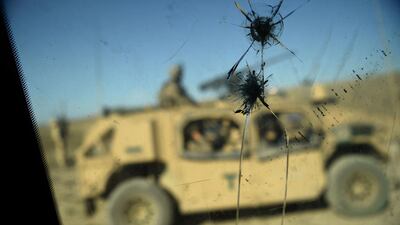High-ranking Iraqi and Russian defence officials discussed prospects for deepening military co-ordination, Iraq’s Defence Ministry said on Thursday.
The future of military relations between Iraq and the US are uncertain after the US drone strike that killed Iran’s most powerful commander, Gen Qassem Suleimani, and Iraqi senior militia leader Abu Mahdi Al Muhandis near Baghdad airport last month.
The attack continues to create friction, prompting powerful Shiite parties to call for an overhaul of the set-up between Iraq and the US-led coalition.
The ministry statement followed a meeting in Baghdad between Iraqi army Chief of Staff Lt Gen Othman Al Ghanimi and the Russian ambassador to Iraq, Maksim Maksimov, as well as a newly arrived defence attache.
Lt Gen Al Ghanimi praised Moscow’s role in the battle against ISIS, saying it provided “our armed forces with advanced and effective equipment and weapons that had a major role in resolving many battles", the ministry said.
It said the sides discussed prospects for “co-operation and co-ordination” and both parties stressed the importance of exchanging information and working together to prevent the resurgence of ISIS.
Mr Maksimov invited Lt Gen Al Ghanimi to visit Moscow and meet Russia's military chief to strengthen co-operation, the military said.
There was no immediate comment from Moscow.
Russia, among other countries, has come forward to offer military support as US-Iraq relations became fraught, a senior Iraqi intelligence official told AP.
“Iraq still needs aerial reconnaissance planes," the official said. "There are countries that have given signals to Iraq to support us or equip us with reconnaissance planes, such as Russia and Iran."
In response to the drone strike that killed Suleimani, Iraq’s Parliament passed a non-binding resolution urging a US troop pull-out, and caretaker prime minister Adel Abdul Mahdi openly called for a troop withdrawal.
Since then, Iraqi leaders have scaled back the sabre-rattling. But behind closed doors, the bitterness has poisoned the partnership.
Senior Iraqi military officials told AP this week that Iraq told its military not to seek assistance from the US-led coalition in joint operations against ISIS and to minimise co-operation.
US Gen Frank McKenzie, the top US commander in the Middle East, acknowledged recently that relations with Iraq were “in a period of turbulence”.

